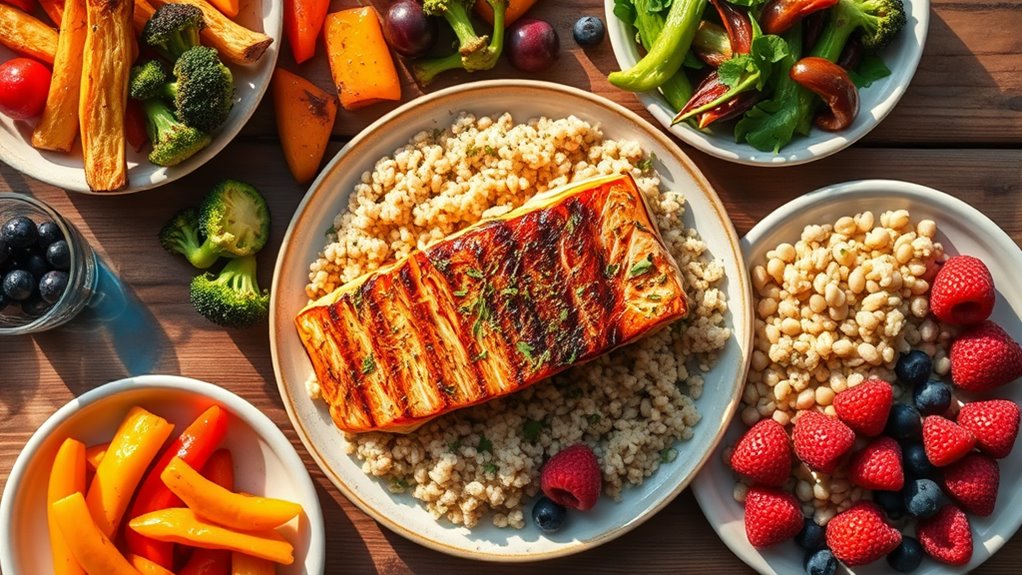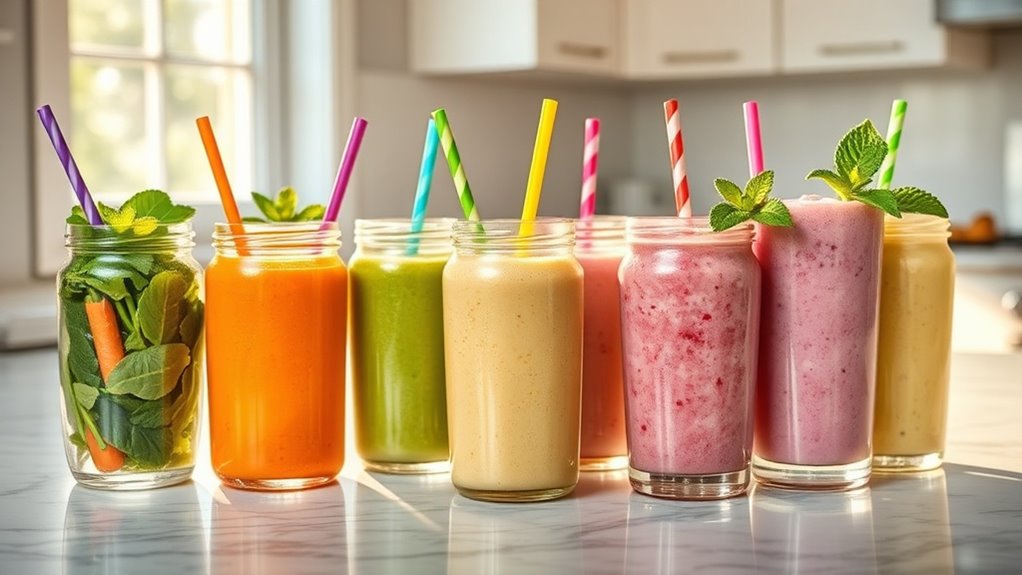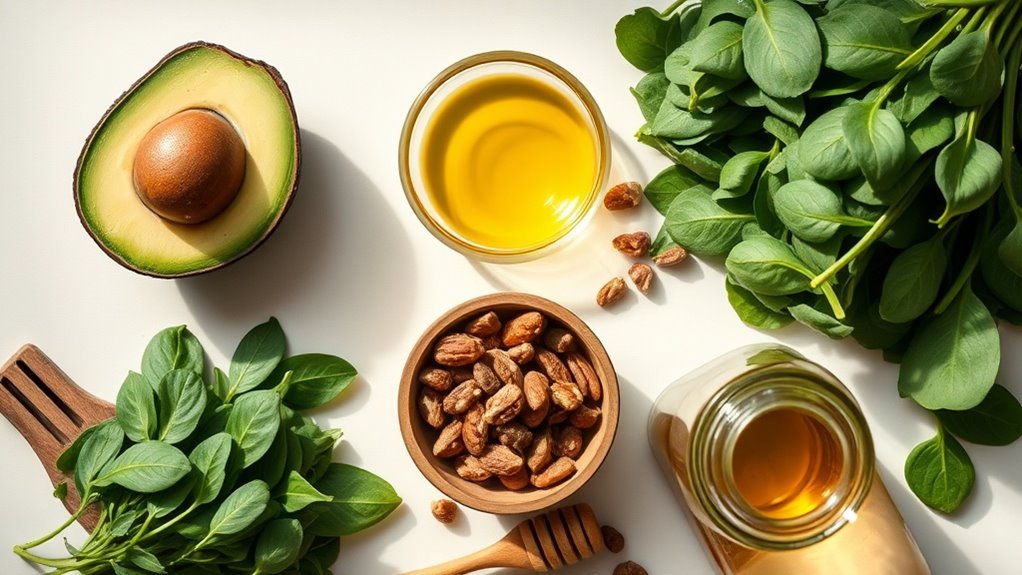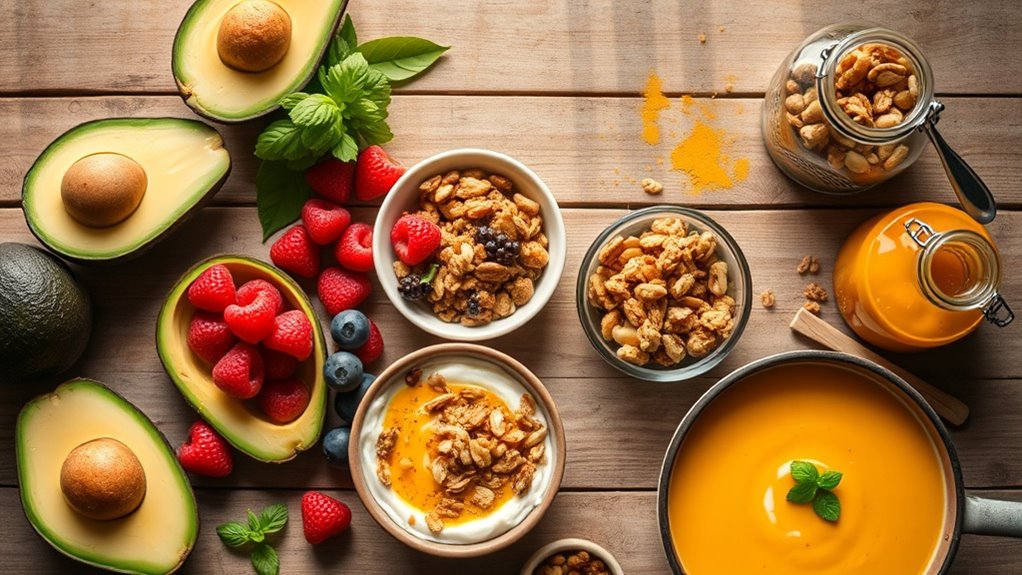Anti-Inflammatory Dinners You’ll Actually Crave!
You’ll actually crave these evidence-based anti-inflammatory dinners that pack omega-3s from salmon to curb inflammation markers, alongside turmeric-spiced veggies for quick, flavorful meals. Whip up veggie-based options with kale, garlic, and herbs to boost antioxidants and gut health, or jump into protein-rich recipes using lentils, chickpeas, and quinoa for complete nutrition. Try nourishing soups, stews, and grilled delights with olive oil and rosemary to enhance wellness. Stick around for even more tasty ideas!
Quick and Easy Anti-Inflammatory Meals
When you’re aiming to reduce inflammation through your diet, quick and easy anti-inflammatory meals offer a practical solution.
You’ll benefit from foods rich in omega-3s, like salmon or flaxseeds, which studies show curb inflammation markers.
Prepare these meals by focusing on whole ingredients; for instance, blend a berry smoothie or grill turmeric-spiced chicken swiftly.
This approach supports health without complexity, making it sustainable for busy days.
Always prioritize evidence-based choices for best results. Incorporating anti-inflammatory meals into your weekly routine can significantly enhance your overall well-being.
Flavorful Veggie-Based Dinners
Flavorful veggie-based dinners let you savor anti-inflammatory benefits while enjoying bold tastes.
You can incorporate nutrient-dense veggies like kale, turmeric, and garlic, packed with antioxidants that reduce inflammation, as supported by dietary studies. Experiment with roasting or stir-frying for enhanced flavors—try herbs like basil or cumin to create satisfying, easy meals that promote gut health without monotony. Additionally, including nutrient-dense ingredients in your meals can significantly boost your overall wellness.
Hearty Protein-Rich Recipes
Hearty protein-rich recipes amp up your anti-inflammatory meals by delivering essential amino acids that curb inflammation, as shown in studies on omega-3 sources like salmon and plant-based options such as lentils.
These options help you build balanced, nutrient-dense dinners.
- Grill salmon to leverage its omega-3 anti-inflammatory effects.
- Add lentils to your plates for fiber-rich, plant-based protein.
- Choose turkey in recipes for lean, low-saturated-fat benefits.
- Incorporate chickpeas for gut-healthy proteins and minerals.
- Use quinoa in meals for complete, inflammation-fighting amino acids.
Including these foods in your diet can enhance your overall wellness by reducing chronic inflammation and promoting better health outcomes.
Nourishing Soups and Stews
Nourishing soups and stews deliver anti-inflammatory benefits by blending nutrient-packed veggies, herbs, and proteins that studies link to reduced inflammation markers. You’ll enjoy preparing simple recipes that pack a punch, like those below, backed by research on omega-3s and antioxidants. Additionally, incorporating powerful foods into your meals can significantly enhance their anti-inflammatory properties.
| Recipe | Key Benefits |
|---|---|
| Turmeric Lentil Soup | Curcumin fights inflammation |
| Veggie Stew | Antioxidants reduce markers |
| Chicken Herb Broth | Proteins aid recovery |
| Bean and Kale Soup | Fiber supports gut health |
These options make anti-inflammatory eating delicious and practical for you.
Grilled and Roasted Options
Grilling and roasting vegetables, proteins, and herbs delivers anti-inflammatory perks by intensifying flavors and nutrients through high-heat methods.
You’ll enjoy meals that pack in omega-3s and antioxidants, making them practical for everyday health.
- Grill salmon to boost omega-3 fatty acids, reducing inflammation effectively.
- Roast broccoli for its sulforaphane content, which supports anti-inflammatory responses.
- Use turmeric in marinades for curcumin’s potent effects on chronic inflammation.
- Opt for olive oil on proteins to add monounsaturated fats that combat oxidative stress.
- Include rosemary in roasts for its polyphenols, enhancing overall anti-inflammatory benefits.
Additionally, incorporating unexpected kitchen staples can further enhance the nutritional profile of your meals.
Wholesome Bowls and Salads
You’ll find that building your anti-inflammatory dinners around wholesome bowls and salads boosts your nutrient intake effectively.
Start with hearty grain bowls that combine whole grains and veggies to fight inflammation.
Explore leafy green salads and superfood combos, which research supports for their role in reducing chronic inflammation.
Hearty Grain Bowls
Hearty grain bowls offer a simple way to build anti-inflammatory meals that pack nutrients and satisfy hunger.
You can customize yours with whole grains and key ingredients to reduce inflammation effectively.
- Start with quinoa; it’s packed with fiber and antioxidants that lower inflammation markers.
- Add turmeric-spiced veggies for curcumin’s proven anti-inflammatory effects.
- Include fatty fish like salmon for omega-3s that combat chronic inflammation.
- Top with nuts such as almonds for their vitamin E content.
- Season using ginger, which studies show reduces inflammatory cytokines.
Leafy Green Salads
Leafy green salads expand on grain bowls by delivering a nutrient-dense option that combats inflammation through their rich array of vitamins and antioxidants. You can easily incorporate these into your dinners to boost your intake of essential nutrients. For example, spinach provides vitamin K, kale offers antioxidants, arugula delivers glucosinolates, romaine supplies folate, and mixed greens add fiber. Here’s a summary:
| Leafy Green | Key Anti-Inflammatory Benefits |
|---|---|
| Spinach | Rich in vitamin K |
| Kale | High in antioxidants |
| Arugula | Contains glucosinolates |
| Romaine | Good source of folate |
| Mixed Greens | Provides fiber and vitamins |
Superfood Combos
Superfood combos elevate your anti-inflammatory meals by blending nutrient-dense ingredients in wholesome bowls and salads, amplifying their health benefits through synergistic effects.
These pairings, supported by research, boost nutrient absorption and reduce inflammation.
- Pair kale and blueberries; their antioxidants work together to reduce inflammation effectively.
- Quinoa with turmeric enhances your body’s anti-inflammatory response, as per clinical studies.
- Spinach and walnuts provide omega-3s that support cardiovascular health.
- Avocado and chia seeds offer healthy fats combating oxidative stress.
- Ginger and lemon in salads promote digestive health and immune function.





